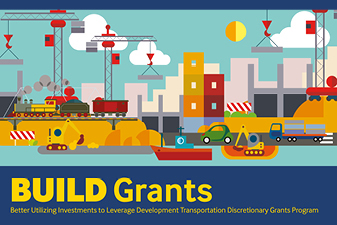|
By Katie Cross, Associate, Blakey & Agnew
The tenth round of the National Infrastructure Investments grant program was officially announced on April 27, 2018. Branded as TIGER by the Obama Administration, the program now has a new name: the Better Utilizing Investments to Leverage Development (BUILD) program. Along with that new name comes a new focus: rural infrastructure.
In the April 2018 Notice of Funding Opportunity (NOFO), the U.S. Department of Transportation (USDOT) states that the transportation infrastructure needs of rural America have been unmet for years and there has been a "slow and steady decline in the transportation routes that connect rural American communities to each other and to the rest of the country." While statute requires that at least 30 percent of the funds from the BUILD grant program be awarded to projects in a rural area, the Trump Administration committed to awarding an even greater share to these projects. This is unsurprising, in March 2018, USDOT announced the awards for the ninth round of this program and gave 64 percent of available funding to rural projects. The press release that accompanied USDOT's release of the ninth round of awards indicated that this was a "historic" level of investment in rural projects for the program.
BUILD's retooled rural-focus in not the only way it differs from its TIGER predecessor. While TIGER used five primary criteria (safety, state of good repair, economic competitiveness, environmental sustainability and quality life) and two secondary criteria (innovation and partnership) to judge applications, BUILD combines those into one category – merely merit criteria. It also adds a new criterion, titled "non-federal revenue for transportation infrastructure investment."
The fiscal year 2018 omnibus, which provided the funding for this round of the BUILD program, stipulated that USDOT "shall not use the Federal share as a selection criteria in awarding projects." But the final criterion considering non-federal revenue dances dangerously close to that and has resulted in Congressional pushback. Senators
|

Collins (R-ME) and Reed (D-RI) criticized the focus on non-Federal revenue as well as the length of the "look back" period for revenue to be considered "new." Other Members of Congress have expressed concern over the amount of flexibility the Administration has in determining criteria and award selections, hinting that they may look to address this in future appropriations packages.
All merit criteria in BUILD will receive equal consideration. Other criteria that will be taken into account by USDOT in selecting projects in this round include project readiness and project costs and benefits, as well as geographic diversity.
BUILD is also significantly larger than recent rounds of TIGER. Funded at $1.5 trillion, this round is equal in funding to only the first round of the TIGER grant program, which came under the American Recovery and Reinvestment Act, and far exceeds funding levels of the eight rounds in between. This increase, triple the fiscal year 2017 funding level of $500 million, comes as the result of a budget deal passed earlier this year that plussed up Federal spending across the board for fiscal years 2018 and 2019.
Not everything has changed with BUILD. The maximum grant size for this round of $25 million, with no more than $150 million awarded to a single state, remains the same. As do the eligible applicants. Applications for this round are due July 19, 2018.
Blakey & Agnew, LLC is a public affairs and
communications consulting firm based in
Washington, DC.
|


